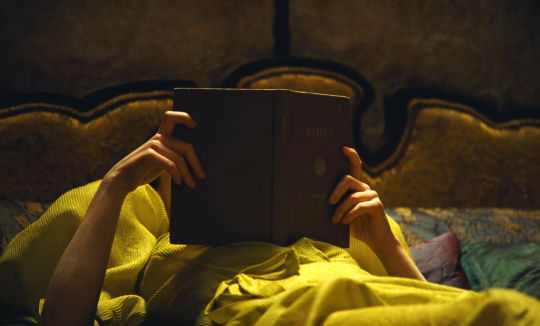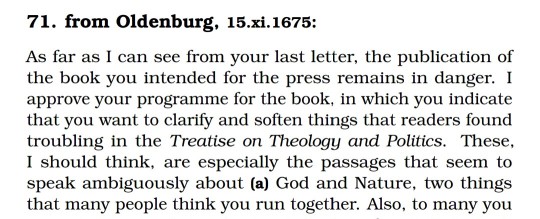#baruch spinoza ethics
Explore tagged Tumblr posts
Text
“We feel and know that we are eternal.” - Baruch Spinoza
130 notes
·
View notes
Text

Poor Things (2023) by Yorgos Lanthimos
Book title: Ethics, Demonstrated in Geometrical Order (Ethica, ordine geometrico demonstrata in Latin; 1677) by Baruch Spinoza
#bella baxter#emma stone#poor things#books in movies#yorgos lanthimos#baruch spinoza#ethics#dutch philosophy
365 notes
·
View notes
Quote
Hatred is increased by being reciprocated, and can on the other hand be destroyed by love.
Baruch Spinoza, Ethics
448 notes
·
View notes
Text

From Baruch Spinoza’s Ethics
20 notes
·
View notes
Text

"please elaborate on the differences that you, the theorist of the concept of God Or Nature, believe exist between the concepts of God and Nature"
#🤡🤡🤡🤡🤡🤡🤡🤡🤡🤡🤡#henry odenburg i diagnose you with Fucking Stupid syndrome.#im sorry but. did you stuff your ears whenever he was talking. dude. like i understand he didnt really have the chance to read the ethics a#the time. (the publication issues are about the ethics)#but still. what the f#“soften things”. he should have died of a stroke#*snowflake who miracolously survived ALL of the definitions killed by the first 20 or so propositions*#the only reason the axioms wouldnt kill him is cause he wouldnt understand the implications#17th century rationalist philosopher baruch spinoza#AMD IT GETS WORSE#i shit you not
10 notes
·
View notes
Text

57 notes
·
View notes
Text

“The temptation which may arise is to take aesthetic things as a model in thinking of moral things.” (Jacques Maritain, An Introduction to the Basic Problems of Moral Philosophy.)
12 notes
·
View notes
Text
The Inside Out Emotions Defined as The Affects in Ethics by Baruch Spinoza
Joy - "Joy is a man's passage from a lesser to a greater perfection."
2. Sadness - "Sadness is a man's passage from a greater to a lesser perfection."
3. Fear - "Fear is an inconstant sadness, born of the idea of a future or past thing whose outcome we to some extent doubt."
4. Envy - "Envy is hate insofar as it so affects a man that he is saddened by another's happiness and, conversely, glad at his ill fortune. To envy one commonly opposes compassion."
5. Anger - "Anger is a desire by which we are spurred, from hate, to do evil to one we hate."
6. Disgust - Spinoza does not explicitly address disgust, but in his definition of desire, it could be extrapolated that he might've described disgust as a sated appetite.
7. Ennui - Spinoza also does not explicitly address ennui or boredom, but again in his definition of desire, it could be extrapolated that he might've described ennui as the lack of desire.
8. Anxiety - Spinoza also does not explicitly address anxiety, but in his definition of fear, it could be extrapolated that he might've described anxiety as fear of a future without hope.
9. Embarrassment - Spinoza also does not explicitly address embarrassment, but he does define shame, which could be a very comparable emotional affect. He defines shame as follows: "Shame is a sadness, accompanied by the idea of some action [of ours] which we imagine that others blame."
#inside out#inside out 2#inside out emotions#emotions#feelings#affect#affection#affects#the affects#emotion#emotional#emotional affect#emotional affects#ethics#baruch spinoza#spinoza#joy#sadness#fear#envy#anger#disgust#ennui#anxiety#embarrassment#shame
5 notes
·
View notes
Quote
يظن الناس أنفسهم أحرارًا لأنهم شاعرون بإرادتهم ورغباتهم، ولكنهم يجهلون الأسباب التي أفضت بهم إلى الإرادة والرغبة
باروخ سبينوزا | الأخلاق
37 notes
·
View notes
Text
"Whoever loves God must not expect God to love him in return."
Baruch Spinoza
The Ethics
#quotes#books#philosophy#reading#literature#amreading#faith#religion#god#belief#love#loving god#christianity#spinoza#baruch spinoza#ethics
19 notes
·
View notes
Text
"[...] I do not know why matter should be unworthy of the divine nature, since there can be no substance external to God by which it can be acted upon. All things, I repeat, are in God, and all things that come to pass do so only through the laws of God's infinite nature and follow from the necessity of his essence."
- Baruch Spinoza, Ethics
15 notes
·
View notes
Text
« vi. Love is pleasure, accompanied by the idea of an external cause.
vii. Hatred is pain, accompanied by the idea of an external cause.
[…]
x. Devotion is love towards one whom we admire.
xi. Derision is pleasure arising from our conceiving the presence of a trait, which we despise, in an object which we hate.
[…]
All happiness or unhappiness depends solely on the quality of the object to which we are bound by love. »
— Baruch Spinoza, Ethics
9 notes
·
View notes
Quote
If anyone conceives that he is loved by another, and believes that he has given no cause for such love, he will love that other in return.
Baruch Spinoza, Ethics
132 notes
·
View notes
Text

From Baruch Spinoza’s Ethics
4 notes
·
View notes
Text
thank you dear @nelyastudies for the tag, this post will be forcing me to actually make time to read this year since I’m sharing my tbr (to be read) list! my goal isn’t much, only 13 books this year but it’s waaayyy better than last year 🫣
sevgili @/nelyastudies’e etketi için teşekkür ederim, bu gönderi sizinle okunacaklar listemi paylaşacağım için beni gerçekten kitap okumaya zorlayacak. bu sene hedefim çok yüksek değil, sadece 13 kitap ancak geçen seneden çoook daha fazla 🫣
— circe by madeline miller
— jane eyre by charlotte brontë
— the picture of dorian gray by oscar wilde
— 1984 by george orwell
— romeo and juliet by william shakespeare
— the perks of being a wallflower by stephen chbosky
— a little life by hanya yanagihara
— I want to die but I want to eat tteokbokki by baek se-hee
— normal people by sally rooney
— ethics by baruch spinoza
+ tbd
#tbr list#to be read#tag game#studyblr#exam#exams#study blog#yks25#student#studying#books and coffee#kappuccinostudies#study#reading#reading goals#2025 reads#2025 tbr#books#bookblr#building habits#habit building#reading habits
8 notes
·
View notes
